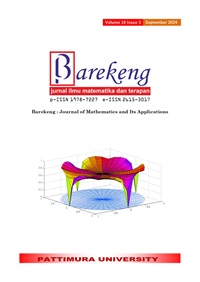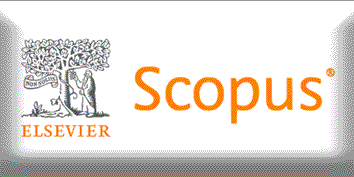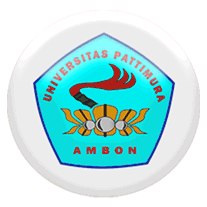OPTIMIZATION OF WASTE MANAGEMENT IN SUMBAWA DISTRICT USING A DYNAMIC SYSTEM MODEL
Abstract
The main problem that occurs in society today apart from basic needs is the problem of waste. This waste problem certainly needs a solution in good, effective, sustainable and long-term management. The waste issue not only occur in big cities but also in developing areas. Sumbawa Regency as one of the regions that continues to develop and grow requires optimum and long-term planning of solid waste management and systems. In 2021, the waste handled in Sumbawa Regency will only be around 17.5% of the total waste. This shows that the waste management system in Sumbawa Regency is not optimal. Optimal waste management can be achieved by taking an academic approach through model development. One such model is the dynamic system model. This can describe the causal relationship between variables that affect solid waste problems and to provide an overview of the waste management system through simulations based on the factors that influence the processing model. Therefore, it is necessary to develop an optimization model for waste management specifically in Sumbawa Regency using a dynamic systems approach. The purpose of this study is to describe waste management in the form of an optimization model for waste management in Sumbawa Regency with a dynamic system. Optimization results show that the optimistic model yields a total of 127.01 tons/day, the moderate model yields a total of 98.23 tons/day and the pessimistic model produces 62.5 tons/day
Downloads
References
Samawarea.com, “Sumbawa Hasilkan 63 Ton Sampah Perhari, Tertangani Hanya 17 Persen,” Samawarea.com, Sumbawa, p. 1, 2019.
K. Popli, G. L. Sudibya, and S. Kim, “A Review of Solid Waste Management using System Dynamics Modeling,” J. Environ. Sci. Int., vol. 26, no. 10, pp. 1185–1200, 2017.
E. Pruyt, Small system dynamics models for big issues: Triple jump towards real-world complexity (1a ed.). Delft: TU Delft Library, 2013.
A. Y. Fauzan, “Strategi pengelolaan sampah untuk mengurangi timbulan sampah plastik (sistem pengelolaan sampah dengan simulasi model sistem dinamik di Pulau Pramuka Kabupaten Adminisrasi Kepulauan Seribu),” Universitas Indonesia, 2017.
Z. Zulfinar and E. Sembiring, “Dinamika Jumlah Sampah Yang Dihasilkan Di Kota Bandung,” J. Teh. Lingkung., vol. 21, no. 1, pp. 18–28, 2015.
N. Rahayu, T. Arai, G. Yudoko, and H. Morimoto, “System dynamics models for planning long-term integrated municipal solid waste management in Bandung city,” WIT Trans. Ecol. Environ., vol. 179 VOLUME, pp. 1153–1168, 2013.
Ikhsandri, “Kajian Infrastruktur Pengolahan Sampah Di Kawasan Berkembang Jakabaring Kelurahan 15 Ulu Kota Palembang,” J. Tek. dan Lingkung., vol. 2, no. 1, pp. 130–138, 2018.
M. G. Retuerto, D. Y. Espinoza, and L. Andrade-Arenas, “System Dynamics Modeling for Solid Waste Management in Lima Peru,” Int. J. Adv. Comput. Sci. Appl., vol. 12, no. 7, pp. 537–542, 2021.
N. K. Ariasih, I. P. A. Bayupati, and I. K. G. Darmaputra, “Sistem Pendukung Keputusan Pemilihan Lokasi TPA Sampah Menggunakan Metode Min_Max Inference Fuzzy,” Maj. Ilm. Teknol. Elektro, vol. 14, no. 1, pp. 7–10, 2015.
B. K. Bala, F. M. Arshad, and K. M. Noh, “Modelling of Solid Waste Management Systems of Dhaka City in Bangladesh,” in System Dynamics: Modelling and Simulation, Singapore: Springer Singapore, 2017, pp. 249–274.
A. Giannis, M. Chen, K. Yin, H. Tong, and A. Veksha, “Application of system dynamics modeling for evaluation of different recycling scenarios in Singapore,” J. Mater. Cycles Waste Manag., vol. 19, no. 3, pp. 1177–1185, 2017.
I. Artika and M. Chaerul, “Model Sistem Dinamik untuk Evaluasi Skenario Pengelolaan Sampah di Kota Depok,” J. Wil. dan Lingkung., vol. 8, no. 3, pp. 261–279, 2020.
C. Lin, “Application of System Dynamics for Municipal Waste Management in China : A Case Study of Beijing,” 31 st Int. Conf. Syst. Dyn. Soc., pp. 1–31, 2013.
A. Firmansyah and E. Suryani, “Model Sistem Dinamik Untuk Pengembangan Smart Economy (Studi Kasus: Kota Surabaya),” J. Tek. ITS, vol. 6, no. 2, 2017.
UNDANG-UNDANG REPUBLIK INDONESIA NOMOR 18 TAHUN 2008 TENTANG PENGELOLAAN SAMPAH. 2008.
K. R. M. Gobai, B. Surya, and S. Syafri, Kinerja Pengelolaan Sampah Perkotaan, vol. 2, no. 2. 2021.
Copyright (c) 2024 Tri Susilawati, Indra Darmawan, Muhammad Saiful Alfaresa

This work is licensed under a Creative Commons Attribution-ShareAlike 4.0 International License.
Authors who publish with this Journal agree to the following terms:
- Author retain copyright and grant the journal right of first publication with the work simultaneously licensed under a creative commons attribution license that allow others to share the work within an acknowledgement of the work’s authorship and initial publication of this journal.
- Authors are able to enter into separate, additional contractual arrangement for the non-exclusive distribution of the journal’s published version of the work (e.g. acknowledgement of its initial publication in this journal).
- Authors are permitted and encouraged to post their work online (e.g. in institutional repositories or on their websites) prior to and during the submission process, as it can lead to productive exchanges, as well as earlier and greater citation of published works.






1.gif)



